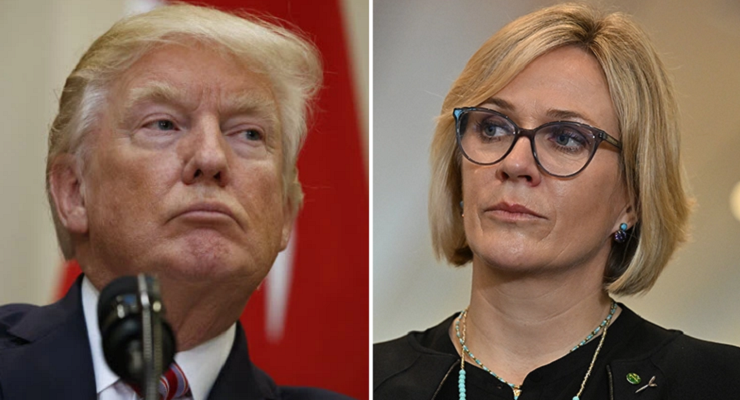
In scenes eerily reminiscent of the January 6 US Capitol insurrection, thousands of supporters of former Brazil president Jair Bolsonaro have breached Brazil’s seat of government, motivated by false claims the October election was stolen.
The immediate parallels drawn between the violence in Brazil and January 6 are in no way coincidental.
Two years and three days ago today, chaos erupted in Washington, as pro-Trump supporters — convinced of the former president’s election fraud lies — briefly seized the Capitol in a deadly insurrection, unmasking the fragility of American democracy in real time.
In its final report, the bipartisan House Select Committee tasked with investigating the attack largely sheeted home blame for the insurrection to Trump, but the committee’s chair, Bennie Thompson, offered a slightly more nuanced reflection.
“If we are to survive as a nation of laws and democracy, this can never happen again,” he said. “If the faith is broken, so [too] is our democracy.”
Implicit in such words lies a sense of the ease with which Trump’s false narratives flourished, without challenge, in the minds of millions of Americans, courtesy of Twitter and Facebook, elements of the conservative media, and, no less, the Republican Party itself.
“I look at the January 6 insurrection as an absolute warning sign to all liberal democracies around the power of misinformation and disinformation,” independent MP Zali Steggall told Crikey.
“Liberal democracies rely on the peaceful transfer of power [and] if a large tranche of citizens no longer have faith in the election process, then you’re really on a slippery slope when it comes to the health of your democracy.”
In Steggall’s view, the January 6 attack is both a parable and portent of the dangers that loom when misinformation and disinformation run roughshod over the democratic condition, the real and perceived legitimacy of which depends on truth.
The Warringah MP said it was largely against this backdrop that she reintroduced a tweaked version of her “Stop the Lies” bill in the final sitting week of Parliament last year.
The modification to the bill, focused on regulating false and misleading claims in political advertising, extended the scope of the proposed laws to cover referenda, which Steggall said were arguably more vulnerable to voter manipulation than elections due to their single-issue focus.
“We’re at a really crucial juncture in Australian history and Indigenous reconciliation,” she said of the Indigenous Voice to Parliament referendum.
“But many people don’t realise that, unlike in business and commerce, where consumers are protected against misleading and deceptive advertising, it’s perfectly legal to lie in political advertising. It’s just a free-for-all.
“And because we live in the era of social media and where you can, for example, do deepfakes and put together completely fabricated material, the risk the referendum will be derailed by misinformation is really dangerous.”
On January 1, Indigenous Australians Minister Linda Burney revealed the referendum could be held as early as August this year — a timeframe Steggall said lent renewed urgency to her reform.
“Labor, both in opposition and now in government, has indicated in-principle support for [truth in political advertising laws],” she said.
“So, the question really comes down to timing: is the government going to allow the referendum debate to be marred by misinformation? Or will it act promptly to ensure it’s a good, fact-based debate?”
It’s a sentiment shared by the Australia Institute’s director of democracy and accountability Bill Browne, who said there was a “strong case” for introducing truth in advertising laws well before the referendum is held.
“Comfortingly, Labor has shown an interest in getting those laws done,” he said. “But under the current process, it wouldn’t be in time for the referendum on the Voice to Parliament.”
Special Minister of State Don Farrell has as recently as November flagged the willingness of the Albanese government to legislate truth in political advertising laws, but probably only after the release of the final report into the 2022 election by the Joint Standing Committee on Electoral Matters later this year.
Several submissions to that inquiry have reiterated Steggall’s call for truth in political advertising laws.
Those behind the submissions include Transparency International Australia, the Centre of Public Integrity, Democracy Matters, and a range of constitutional law experts, including scientia professor George Williams and Monash University professor Luke Beck.
Speaking to Crikey, Beck said truth in political advertising laws, which have existed in South Australia for nearly four decades and were recently legislated in the ACT, commonly excite opposition among free speech zealots, who erroneously view such laws as an affront to free expression.
“Some people worry truth in political advertising laws might capture opinions, but those concerns are unfounded,” he said. “The South Australian laws don’t capture opinions, and what Zali Steggall and others are proposing won’t capture opinion.”
“Under the laws, you can still express any opinion you like. But if you make a claim about a factual matter that is false and materially misleading, then you would be captured by the laws.”
To illustrate the point, Beck drew a distinction between the claim the Indigenous Voice to Parliament would “divide Australia” and the claim it would have a right to “veto government decisions”.
The former would be permitted under the laws, he said, because it is opinion, while the latter would enliven the laws, precisely because it is a statement of fact that is false and materially misleading.
“Everybody accepts we should have misleading and deceptive laws in the commercial space, and so truth in political advertising is essentially just extending these rules into the political sphere,” he said.
In Beck’s view, the overriding purpose of truth in political advertising laws was not so much to penalise false and misleading claims presented as fact, but to deter the emergence of misinformation by fostering a normative or cultural shift in the conduct of politics.
“The idea is not about penalising people; it’s about preventing misinformation in the first place,” he said, pointing out enforcement action is these days rarely required in South Australia.
But others, such as Transparency International, say any change in the conduct of federal politics as usual, which is increasingly under attack by misinformation, is unlikely absent “credible sanctions”.
Steggall agrees: “Much of the jurisprudence in our society turns on the deterrent effect of laws because of the consequences that would flow if they were broken,” she said. “And we need that [deterrent effect] in politics as well.”
She added that no one in favour of truth in political advertising reform — which, incidentally, finds support among more than nine out of 10 Australians — is seriously of the view the laws would operate as a full panacea to the ills of misinformation.
The point, rather, is to impede the spread of misinformation and tip the scales in favour of a society governed — in the words of Harvard historian Jill Lepore — by reflection, reason and truth, rather than violence, prejudice and deceit.
“Ultimately, our democracy is fragile,” Steggall said. “It’s really important we put up as many protections as possible against misinformation and disinformation.”








It’s embarrassing that we need to PUSH for truth in political advertising.
This is long overdue. Go Zali, and c’mon ALP – do the right thing
Just wondering what impact Truth in Political Advertising laws would have had on comments by former Prime Minister John Howard, in relation to the Tampa refugees and “children overboard” claims.
The article talks about Social Media being a spreader of Misinformation, but our MSM is also awash with it.
Over the last couple of Months there have been multiple articles in the Australian, including about 5 or 6 by Andrew Bolt, that persist with a lot of misinformation around the Voice. Things like still claiming that it is another Chamber of Parliament, that it will not be truly representative of Aboriginal peoples, that it will be able to block legislation, or even create legislation.
Expect more. When there is an absence of information it provides the opportunity for speculation. Publish the detail and the option to speculate disappears. BTW. Speculation is not disinformation. How can you have disinformation when there is no actual factual, detailed information to review? If they were making those claims after detailed information is provided then I would agree it is disinformation. Albo’s Government has provided SFA so it is speculation.
Albo needs to stump up the detail ASAP to put speculation to bed.
Good article, particularly as no coverage anywhere else. I wonder why?
I acknowledge that there is a need for truth in politics. Thus I support the proposed with trepidation.
In many cases it is in fact our government who is lying to us. Many of the current geo issues are being misrepresented by pollies and supported my a lame duck indolent media.
To avoid controversy relating to a number of current issues – the Pentagon Papers say it all. What has changed?
Is there any body out there whos does not believe the CIA is not involved in Brazil. It is straight from their playbook.
If so give me some odds as I will definitely have some money on it. A lot easier that and a much better return than a TAB Bet.
My opinion on “The Voice” sorry but it is a consolation prize instead of a genuine TREATY.
Australia 200 years old and still not an adult nation.